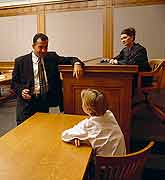
MONDAY, July 26 (HealthDay News) — Children may be better than young adults when it comes to testifying about emotionally charged events, a new study suggests.
Researchers tested the memory of children aged 7 to 11 and adults aged 18 to 23 by showing them lists of words that are linked to emotions, such as “pain,” “cut,” “ouch,” “cry” and “injury.”
In lists where a closely related word — such as “hurt” — was left off the list, participants would often make the mistake of recalling that “hurt” was on the list, the investigators found.
“We found something different than what leading theories of emotional memory in adults say. By manipulating the emotional content of word lists, we found that materials that had negative emotional content in fact produced the highest levels of false memory,” Charles Brainerd, a professor of human development at Cornell University, said in a university news release.
The accuracy of the children’s memory was bad, but accuracy was even worse in the young adults, Brainerd and his colleagues reported.
The findings have major implications for the legal system, the study authors pointed out.
“In the great preponderance of legal cases, the only evidence that’s determinative is what people say happened. That’s it,” said Brainerd, director of Cornell’s psychology and law program. “So the question of the conditions under which your memory of events is distorted is the most fundamental question about the reliability of evidence — because it is most of the evidence.”
The study was released online in advance of publication in the October print issue of the Journal of Experimental Child Psychology.
More information
The Child Witness Project has more about children’s testimony.

